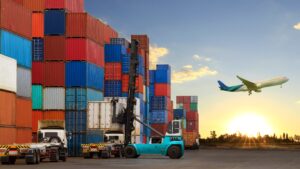
Dubai is known as one of the world’s most extravagant cities. The largest and most populous city in the United Arab Emirates is home to the tallest building and massive malls in the world. The mere mention of its name conjures images of royalty, flashy sports cars, and towering skyscrapers. And from within, its glittering reputation shines more brightly, the asset that draws envious glances from around the world, i.e., UAE’s geographic location and its prosperous city.
It all goes back to the year 1962 when the discovery of oil changed the face of UAE’s trading market, and within days it became a central trading hub. It was a significant milestone in the UAE’s history of trade. The then ruler of Dubai – His Highness Sheikh Rashid Bin Saeed Al Maktoum, had a vision for the Dubai creek which envisioned and came to life in 1972 as Port Rashid and again in 1985 as Jebel Ali Port, the first-ever Free Trade Zone of UAE. Thus, starting a long legacy for making the country a hub for import-export business, especially in Dubai.
Today, the United Arab Emirates is perfectly placed to do business with both established and emerging markets in Europe, Asia, the Middle East, and Africa. However, with two-thirds of the world’s population and within an eight-hour flight, it’s the ideal hub to trade with all corners of the globe. This position is only strengthened by comprehensive road, sea, and air links: the UAE is home to some of the world’s busiest airports and seaports. In 2016 alone, the UAE was reported to have exported a whopping total of USD 174bn worth of goods, with imports reaching up to USD 196bn in the same year. Therefore, it doesn’t come as a surprise that the import-export-trading license in Dubai is one of the most sought after in the United Arab Emirates, with overseas entrepreneurs commonly choosing to set up in Dubai’s free zones.
Realizing the potential of their trade market, Dubai has been forthcoming of new and innovative businesses, luring them through low-cost licenses.
Now, before we go into how to start an import-export business in Dubai with a low-cost license, let’s do a quick review of some other salient features you need to know regarding the setting up of import-export companies in Dubai:
–Set up in a free zone for enjoying more benefits
-Plenty of visa options for employers and employees
-Easier to sponsor dependants, including sponsoring their visas as well
-Set up with multiple shareholders
-Easy to acquire a corporate bank account, post obtaining a business license.
Now, let’s understand how to set up an import-export business and how other import-export companies in Dubai are readily doing so!
Acquiring an Import-Export License
Import-export businesses in Dubai require an import-export license to function. The protocol followed for getting a license is pretty straightforward and can be easily conducted online. However, in exporting or importing restricted or special goods, one must acquire an exclusive license from the Customs Office.
After acquiring the import license made available by Dubai Customs Office at really affordable prices with relatively lax jurisdictions, any organisation involved in an import-export business in Dubai can get or buy commodities from beyond UAE’s borders. The company will be able to import any goods from a foreign country or any different province of Emirates by meeting all legal, system, procedures and methods permissions, documentation, and licensing terms, just at the behest of this license.
Similarly, after acquiring the export license, the business will be able to trade in goods or services produced locally in any other country or among the free trade zones of UAE. The attaining of an export license relieves the business involved from paying any customs duty considering they are conducting their business in the Free Trade Zone of UAE, as it does not come under the UAE Customs Territory.
Registration with Customs
After completing the first step, i.e., to acquire a low-cost import-export license, you would be surprised to know that half the battle’s already won. The second half involves registering the import-export companies in Dubai with the Customs Department. A vital import code generated from the United Arab Emirates customs is needed to bring goods into the country by sea or air. Additionally, commodities that go through customs from a free zone to the local market are taxed with a nominal duty fee. Accordingly, all commodities imported or exported should pass through the customs office and will check whether they identify under the banned list or not.
With the benefits of opening up an import-export business in Dubai, from the comfort of your homes and with restrictions so lax that attaining an import- export license is a cakewalk, there’s no surprise as to why the world eyes Dubai as an up and coming market for setting up of import-export businesses in Dubai.

